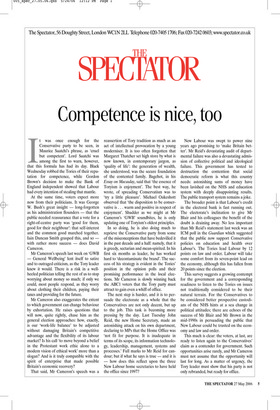Competence is nice, too
It was once enough for the Conservative party to be seen, in Maurice Saatchi’s phrase, as ‘cruel but competent’. Lord Saatchi was among the first to warn, however, that this formula has had its day. Black Wednesday robbed the Tories of their reputation for competence, while Gordon Brown’s decision to make the Bank of England independent showed that Labour had every intention of stealing that mantle.
At the same time, voters expect more now from their politicians. It was George W. Bush’s great insight — long-forgotten as his administration flounders — that the public needed reassurance that a vote for a right-of-centre party was ‘good for them, good for their neighbour’: that self-interest and the common good marched together. Iain Duncan Smith grasped this, and so with rather more success — does David Cameron.
Mr Cameron’s speech last week on ‘GWB — General Wellbeing’ lent itself to satire and to outraged criticism, as the Tory leader knew it would. There is a risk in a wellheeled politician telling the rest of us to stop worrying about money so much; if only we could, most people respond, as they worry about clothing their children, paying their taxes and providing for the future.
Mr Cameron also exaggerates the extent to which government can change behaviour by exhortation. He raises questions that will now, quite rightly, chase him as the general election approaches: how, exactly, is our ‘work-life balance’ to be adjusted without damaging Britain’s competitive advantage and the flexibility of its labour market? Is his call ‘to move beyond a belief in the Protestant work ethic alone to a modern vision of ethical work’ more than a slogan? And is it truly compatible with the spirit of enterprise that made possible Britain’s economic recovery?
That said, Mr Cameron’s speech was a reassertion of Tory tradition as much as an act of intellectual provocation by a young moderniser. It is too often forgotten that Margaret Thatcher set high store by what is now known, in contemporary jargon, as ‘quality of life’: the generation of wealth, she understood, was the secure foundation of the contented family. Bagehot, in his Essay on Macaulay, said that ‘the essence of Toryism is enjoyment’. The best way, he wrote, of spreading Conservatism was to ‘try a little pleasure’. Michael Oakeshott observed that ‘the disposition to be conservative is ... warm and positive in respect of enjoyment’. Shudder as we might at Mr Cameron’s ‘GWB’ soundbites, he is only updating one of Toryism’s oldest principles.
In so doing, he is also doing much to reprieve the Conservative party from some of the misconceptions that have bedevilled it in the past decade and a half: namely, that it is greedy, sectarian and mean-spirited. In his first six months as leader, he has worked hard to ‘decontaminate the brand’. The success of his strategy is evident in the Tories’ position in the opinion polls and their promising performance in the local elections. Mr Cameron is slowly winning back the ABC1 voters that the Tory party must attract to gain even a whiff of office.
The next step is harder, and it is to persuade the electorate as a whole that the Conservatives are not only decent, but up to the job. This task is becoming more pressing by the day. Last Tuesday John Reid, the new Home Secretary, made an astonishing attack on his own department, declaring to MPs that the Home Office was ‘not fit for purpose. It is inadequate in terms of its scope, its information technology, leadership, management, systems and processes.’ Full marks to Mr Reid for candour; but if what he says is true — and it is — how does this reflect upon the three New Labour home secretaries to have held the office since 1997? New Labour was swept to power nine years ago promising to ‘make Britain better’. Mr Reid’s devastating audit of departmental failure was also a devastating admission of collective political and ideological failure. This government has tested to destruction the contention that social democratic reform is what this country needs: astonishing sums of money have been lavished on the NHS and education system with deeply disappointing results. The public transport system remains a joke.
The broader point is that Labour’s credit in the electoral bank is fast running out. The electorate’s inclination to give Mr Blair and his colleagues the benefit of the doubt is draining away. No less important than Mr Reid’s statement last week was an ICM poll in the Guardian which suggested that the public now support Conservative policies on education and health over Labour’s. The Tories lead Labour by 12 points on law and order. Labour will take some comfort from its seven-point lead on the economy, although this has fallen from 20 points since the election.
This survey suggests a growing contempt for the government and a corresponding readiness to listen to the Tories on issues not traditionally considered to be their natural terrain. For the Conservatives to be considered better prospective custodians of the NHS hints at a sea change in political attitudes; there are echoes of the success of Mr Blair and Mr Brown in the mid-1990s in persuading the public that New Labour could be trusted on the economy and law and order.
This much is clear: the voters, at last, are ready to listen again to the Conservatives’ claim as a contender for government. Such opportunities arise rarely, and Mr Cameron must not assume that the opportunity will last for long. As a matter of urgency, the Tory leader must show that his party is not only rebranded, but ready for office.










































































































 Previous page
Previous page